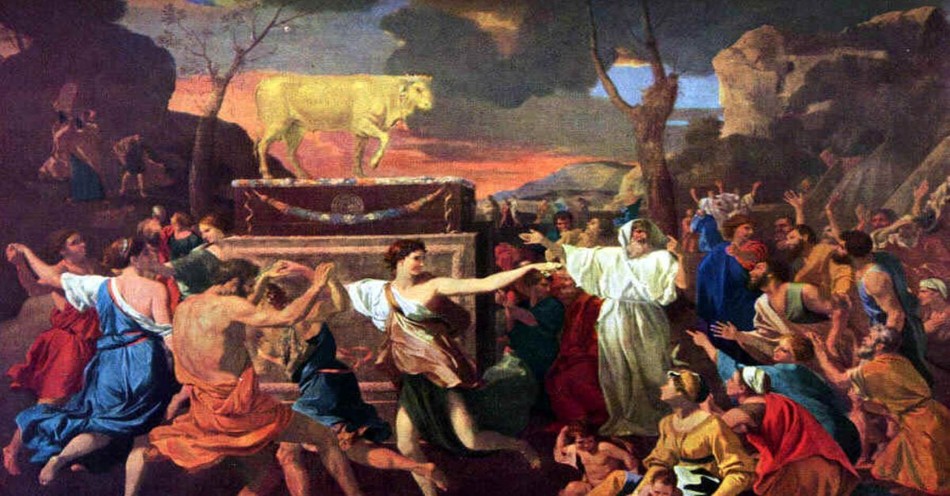Idolatry is the worship of idols. It is a recurring and central theme in the Bible, representing a fundamental breach of the commandments delivered to the ancient Israelites. Both the Old and New Testaments address the issue with intense scrutiny, framing idolatry not merely as the worship of physical statues but as any act that places a person, object, or concept above the sovereign position of God. This article explores the various manifestations of idolatry as depicted in Scripture, and the consequences of such practices for believers.
Idolatry: Table of Contents
Idolatry Definition
According to Easton's Bible Dictionary, Idolatry is "image-worship or divine honour paid to any created object." Paul describes the origin of idolatry in Romans 1:21-25: men forsook God, and sank into ignorance and moral corruption (Romans 1:28).
The forms of idolatry are,
- Fetishism, or the worship of trees, rivers, hills, stones, etc.
- Nature worship, the worship of the sun, moon, and stars, as the supposed powers of nature.
- Hero worship, the worship of deceased ancestors, or of heroes.
Idolatry in the Bible
In Scripture, idolatry is regarded as of heathen origin, and as being imported among the Hebrews through contact with heathen nations. The first allusion to idolatry is in the account of Rachel stealing her father's teraphim (Genesis 31:19), which were the relics of the worship of other gods by Laban's progenitors "on the other side of the river in old time" (Joshua 24:2). During their long residence in Egypt the Hebrews fell into idolatry, and it was long before they were delivered from it (Joshua 24:14; Ezekiel 20:7). Many a token of God's displeasure fell upon them because of this sin.
The first and second commandments are directed against idolatry of every form. Individuals and communities were equally amenable to the rigorous code. The individual offender was devoted to destruction (Exodus 22:20). His nearest relatives were not only bound to denounce him and deliver him up to punishment (Deuteronomy 13:20-10), but their hands were to strike the first blow when, on the evidence of two witnesses at least, he was stoned (Deuteronomy 17:2-7). To attempt to seduce others to false worship was a crime of equal enormity. An idolatrous nation shared the same fate. No facts are more strongly declared in the Old Testament than that the extermination of the Canaanites was the punishment of their idolatry, and that the calamities of the Israelites were due to the same cause (Jeremiah 2:17). "A city guilty of idolatry was looked upon as cancer in the state; it was considered to be in rebellion, and treated according to the laws of war. Its inhabitants and all their cattle were put to death." Jehovah was the theocratic King of Israel, the civil Head of the commonwealth, and therefore to an Israelite idolatry was a state offense (1 Samuel 15:23), high treason. On taking possession of the land, the Jews were commanded to destroy all traces of every kind of the existing idolatry of the Canaanites.
The history of Israel is clearly outlined in the Bible. For generation after generation, they repeatedly fell prey to being drawn away from the Lord to serve false gods. This did not only happen to the common people, but to their kings, priests, and prophets, as well. And they shall turn away their ears from the truth, and shall be turned unto fables (2 Timothy 4:4).
The sin of idolatry, or worshiping other gods, is in violation of the Law of God. As a matter of fact, it breaks the first two of the Ten Commandments. It is important to remember that disobedience is the original sin and therefore encompasses all sin. I am the LORD thy God, which have brought thee out of the land of Egypt, out of the house of bondage. Thou shalt have no other gods before Me. Thou shalt not make unto thee any graven image or any likeness of anything that is in heaven above, or that is in the earth beneath, or that is in the water under the earth (Ex. 20:2-4).
Excerpt from Beware the Sin of Idolatry by Bible Pathway
Bible Verses about Idolatry
- 1 Corinthians 10:7-14 - Do not be idolaters, as some of them were; as it is written: “The people sat down to eat and drink and got up to indulge in revelry.” We should not commit sexual immorality, as some of them did—and in one day twenty-three thousand of them died. We should not test Christ, as some of them did—and were killed by snakes. And do not grumble, as some of them did—and were killed by the destroying angel. These things happened to them as examples and were written down as warnings for us, on whom the culmination of the ages has come. So, if you think you are standing firm, be careful that you don’t fall! No temptation has overtaken you except what is common to mankind. And God is faithful; he will not let you be tempted beyond what you can bear. But when you are tempted, he will also provide a way out so that you can endure it. Therefore, my dear friends, flee from idolatry.
- 1 John 5:21 - Dear children, keep yourselves from idols.
- Colossians 3:5 - Put to death, therefore, whatever belongs to your earthly nature: sexual immorality, impurity, lust, evil desires and greed, which is idolatry.
- Isaiah 45:20 - “Gather together and come; assemble, you fugitives from the nations. Ignorant are those who carry about idols of wood, who pray to gods that cannot save.
- Jonah 2:8 - “Those who cling to worthless idols turn away from God’s love for them.
Examples of Idolatry in Scripture
The Golden Calf (Exodus 32): Perhaps the most famous example, this incident occurs when the Israelites, having just been freed from Egyptian slavery, create a golden calf to worship while Moses is receiving the Ten Commandments on Mount Sinai. This act of idolatry angers God, who threatens to destroy the Israelites, although Moses intercedes on their behalf.
The Worship of Baal (1 Kings 18): During the reign of Ahab in the northern kingdom of Israel, idol worship, especially of the Canaanite god Baal, becomes prevalent. The prophet Elijah challenges 450 prophets of Baal to demonstrate whose god is real, which culminates in a dramatic contest on Mount Carmel where God's supremacy is dramatically confirmed by fire from heaven.
Nebuchadnezzar’s Statue (Daniel 3): King Nebuchadnezzar of Babylon creates a giant gold statue and commands all his officials to worship it. Shadrach, Meshach, and Abednego refuse to comply, leading to their miraculous survival of being thrown into a fiery furnace, showcasing their steadfast faith and God's power over idolatrous practices.
The Rich Young Ruler (Matthew 19:16-24): In the New Testament, Jesus encounters a man who claims to have kept all the commandments but cannot bring himself to give up his wealth to follow Christ. This story illustrates that idolatry isn't limited to the worship of physical idols but extends to anything that takes priority over God, including wealth and material possessions.
Quotes about Idolatry
"There is nothing so abominable in the eyes of God and of men as idolatry, whereby men render to the creature that honor which is due only to the Creator" - Blaise Pascal
"The essence of idolatry is the entertainment of thoughts about God that are unworthy of Him." - A. W. Tozer
"Verily, we know not what an evil it is to indulge ourselves, and to make an idol of our will." - Samuel Rutherford
"You don't have to go to heathen lands today to find false gods. America is full of them. Whatever you love more than God is your idol." - Dwight L. Moody
"As long as you want anything very much, especially more than you want God, it is an idol." - A. B. Simpson





